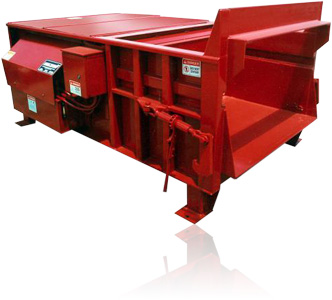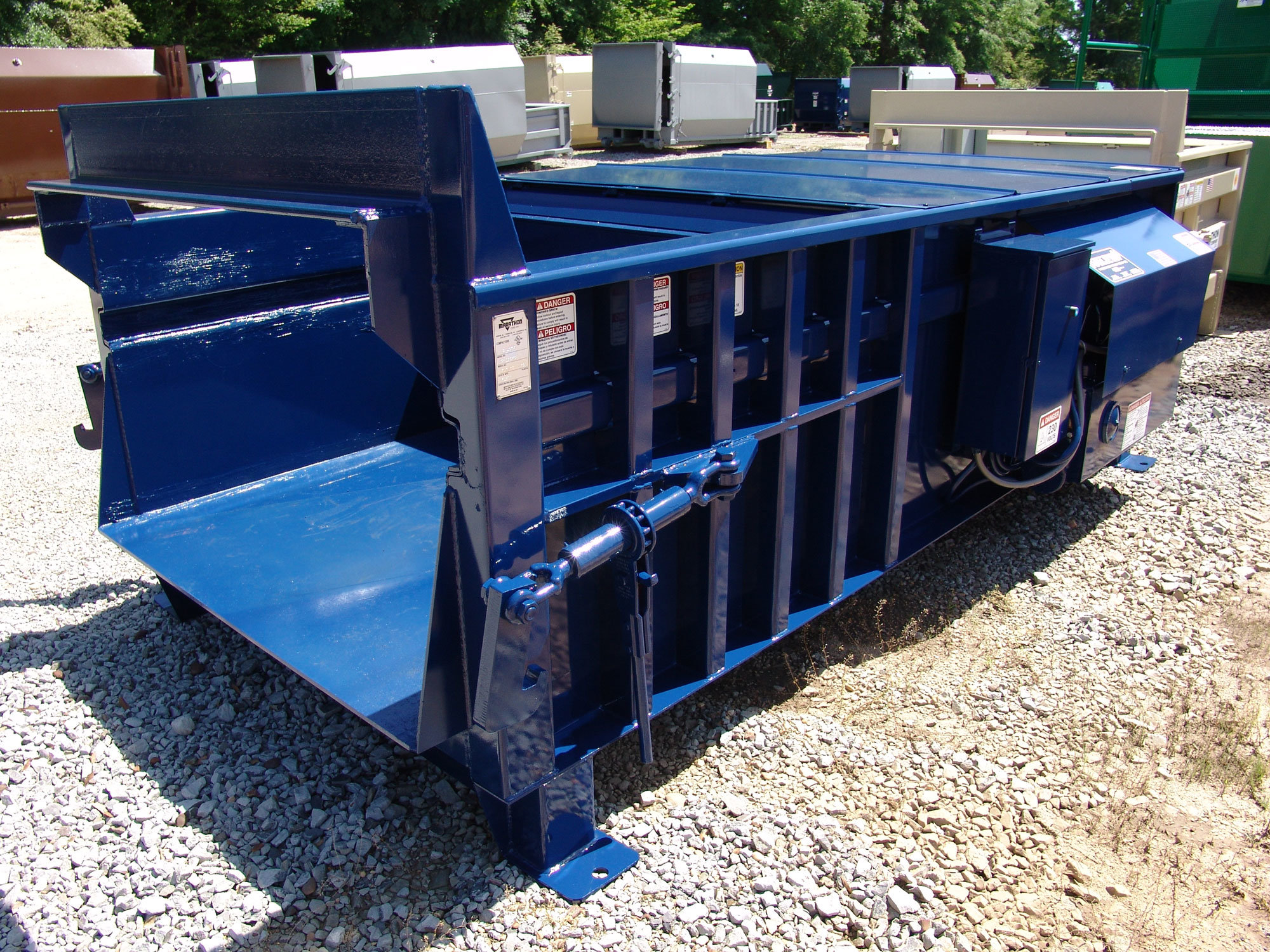A closer look at Commercial trash compaction equipment for better waste solutions
Understanding the Different Uses Waste Tools in the Recycling Industry
The reusing industry counts greatly on specialized waste devices to enhance processing and recovery. Each device, from shredders to balers, offers a distinctive function that boosts total efficiency. Recognizing these roles is vital for boosting sustainability initiatives. Commercial garbage compaction equipment. As innovation advances, new technologies emerge, guaranteeing to change traditional practices. This development elevates important questions concerning the future of waste administration and its effect on environmental preservation. What changes lie ahead for this important market?
The Role of Shredders in Material Handling
Shredders play a vital function in the reusing market by effectively processing various sorts of waste products. These machines are designed to decrease large products, such as plastics, metals, and natural waste, right into smaller, manageable items. This dimension reduction is necessary for succeeding recycling procedures, as it enables for easier handling and sorting. Along with helping with recycling, shredders boost security by reducing the threat of injury related to managing cumbersome waste items.
Moreover, shredders contribute to environmental sustainability by ensuring that materials are processed in a manner that maximizes resource healing. They can manage a diverse series of materials, making them functional tools in waste monitoring centers. The effective procedure of shredders not only simplifies the recycling procedure yet additionally enhances the total efficiency of waste diversion initiatives, promoting a round economic climate. Their significance in product handling can not be overstated, as they work as a foundational step towards lasting waste management practices.

Just How Balers Enhance Efficiency in Waste Administration
Balers considerably enhance performance in waste administration by condensing numerous products into bundles, which streamlines storage and transport. By compressing recyclables such as cardboard, plastics, and metals, balers considerably minimize the quantity of waste. This compression not just optimizes space in recycling facilities however also lessens the variety of trips needed to transport materials, leading to lower gas costs and reduced ecological influence.
Moreover, balers add to boosted security in waste administration procedures. Portable bales are less complicated to pile and take care of, reducing the risk of mishaps connected with loose materials. The uniform size of bales permits for much more reliable packing and unloading procedures, simplifying operations within recycling centers. Furthermore, balers can boost the general top quality of recyclables, as effectively compacted materials are much less most likely to be contaminated. Overall, balers play a necessary function in enhancing waste monitoring practices, promoting sustainability in the reusing industry.
Conveyor Solutions: Streamlining the Recycling Process
Incorporating advanced equipment like balers considerably enhances waste administration procedures, yet the effectiveness of the recycling process is better improved via the usage of conveyor systems. These systems play a vital role in the smooth transportation of products within reusing facilities. By assisting in the movement of various waste kinds, conveyor systems reduce hand-operated handling and lower the risk of contamination during the reusing process.
Additionally, conveyor systems can be customized to fit the special formats and functional needs of reusing centers. Their ability to run continuously permits a stable circulation of products, enhancing productivity and making sure that sorting and refining tools gets a regular supply.
Furnished with features like flexible rates and automated controls, conveyor systems can maximize the flow of products, considerably boosting total performance (Commercial garbage compaction equipment). Subsequently, these systems are important in contemporary recycling operations, contributing and streamlining procedures to effective waste administration
Sorting Machines: The Trick to Material Healing
Sorting equipments are essential components in the recycling industry, significantly enhancing the performance of material recovery. These equipments play a pivotal duty in the separation of numerous recyclable products, allowing for a streamlined process that takes full advantage of source extraction. By making use of innovative modern technologies, such as optical sensing units and air classifiers, sorting devices can identify and categorize products Read Full Article based on Recommended Reading their structure, weight, and size. This capacity ensures that steels, plastics, and paper products are successfully separated, decreasing contamination and enhancing the quality of recycled output.
The operation of sorting equipments considerably minimizes the reliance on manual labor, which can be both time-consuming and vulnerable to errors - Commercial garbage compaction equipment. Additionally, the automation given by these machines accelerates the total recycling process, resulting in greater throughput and boosted functional effectiveness. Consequently, arranging devices are essential in attaining lasting waste management goals, allowing the recycling sector to effectively recuperate valuable products while reducing garbage dump reliance

Advancements in Waste Devices for a Lasting Future
Current advancements in waste devices are driving the recycling industry toward an extra sustainable future. Technologies such as automated arranging systems, which utilize expert system and artificial intelligence, boost effectiveness by precisely recognizing and dividing recyclables. This results in higher recuperation prices and lowered contamination. Additionally, advancements in compacting technology see page enable a lot more efficient transportation of materials, lessening carbon impacts throughout transportation.
Developments in shredding tools enhance the processing of complicated materials, making it possible for the recycling of items that were as soon as considered non-recyclable. The combination of eco-friendly energy sources, like solar energy, in waste processing centers even more adds to sustainability goals. On top of that, technologies in waste-to-energy technologies and biodegradable products are reshaping the landscape of waste management. Jointly, these innovations symbolize a transformative change within the reusing market, advertising not only ecological protection however likewise economic viability for future generations.
Frequently Asked Inquiries
What Kinds Of Materials Can Waste Equipment Manage?
The kinds of products waste equipment can handle include plastics, steels, paper, glass, and natural waste. Each equipment kind is developed for details products, optimizing effectiveness and efficiency in sorting and refining numerous waste streams.
Just How Typically Should Waste Devices Be Maintained?

Exist Security Interest In Using Waste Tools?
Safety interest in using waste tools consist of potential injuries from mechanical breakdowns, exposure to hazardous materials, and insufficient training. Correct maintenance, regular inspections, and worker education and learning are important to alleviate these dangers successfully in any kind of setup.
What Is the Ordinary Life-span of Recycling Tools?
The average life expectancy of recycling equipment usually ranges from 10 to two decades, depending on variables such as use strength, upkeep practices, and technological innovations, which can substantially affect sturdiness and efficiency gradually.
Just How Is Waste Tools Powered in Recycling Facilities?
Waste equipment in reusing facilities is usually powered by electrical power, though some devices may utilize alternative energy sources like gas or diesel. This power makes it possible for effective processing and makeover of products for reusing objectives.
Shredders play an important role in the recycling sector by efficiently processing numerous types of waste materials. They can manage a diverse variety of products, making them versatile devices in waste administration facilities. Balers significantly enhance performance in waste monitoring by compacting numerous materials into bundles, which simplifies storage space and transport. The kinds of materials waste tools can handle consist of plastics, steels, paper, glass, and organic waste. Safety and security concerns with utilizing waste tools consist of potential injuries from mechanical breakdowns, exposure to dangerous materials, and insufficient training.